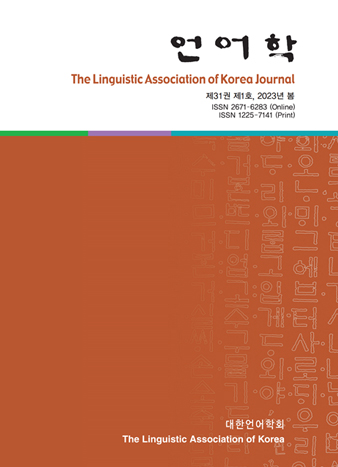대한언어학회 전자저널

31권 1호 (2023년 3월)
- Analysis of International Students' Adaptation to Korean Language Environment
-
Jin-Sook Choi
Pages : 65-83
Abstract
Choi, Jin-Sook. (2023). Analysis of international students' adaptation to Korean language environment. The Linguistic Association of Korea Journal, 31(1), 65-83. This study investigates how well international students adapt to the Korean language environment, and analyzes how adaptation differs according to the Korean proficiency presented when entering university. For this study, 45 international students at Y University participated in a questionnaire survey and 6 in-depth interviews. The results of the questionnaire survey are as follows; their Korean proficiency improved from the grades presented at admission, the exposure to Korean was generally high, attitudes toward Korean were positive, and most of the participants had part-time jobs. However, as a result of analyzing by Korean proficiency at the time of admission, the higher the Korean proficiency, the higher the current Korean proficiency. The previous semester's academic achievement was also higher for students with higher Korean proficiency. It is also revealed that the group with higher Korean proficiency had higher exposure to Korean culture, and more favorable attitudes toward Korean and Korean culture, and higher rate of part-time work. Furthermore, the in-depth interview results showed consistency with the questionnaire quantitative survey. Therefore, this study suggests that Korean proficiency of international students can be an important variable to adapt to Korean language environment.
Keywords
# international students # adaptation # Korean language
References
- Bettoni, C. (1989). Language loss Italians in Australia: A summary of current research. Review of Applied Liguisitics, 83-84, 37-50.
- Cenoz, J., Garcia, L., & Maria, L. (1999). The acquisition of English pronunciation: Learners' view. International Journal of Applied Linguistics, 9(1), 3-17.
- Choi, J. S. (2011). A study on changes in language attitudes among primary school students. Linguistic Research, 28(2), 431-450.
- Choi, J. S. (2012). A study of changes in attitudes towards English medium instructions among university students. The Linguistic Association of Korea Journal, 20(3), 137-155.
- Choi, J. S. (2015). An analysis of the relationship between Chinese students' Korean skills and their part-time work. The Linguistic Association of Korea Journal, 23(2), 115-131.
- Choi, J. S. (2017). A study on attitudes towards English among Chinese students. The Sociolinguistic Journal of Korea, 25(1), 239-262.
- Choi, J. S. (2019). Attitude changes towards Korean among international students who entered into the university based on English proficiency. The Linguistic Association of Korea Journal, 27(4), 53-66.
- Jang, H, J., & Han, J. W. (2020). Hankuk uhakyatneondae hangukin chinguga upseoyo (I came to Korea to study, but I don't have any Korean friends). OhmyNews (2020. 12. 3.).
- Joo, H. J. (2010). Learning experience of international students in Korea university. Gyoukmunjeyeongu, 36, 135-159.
- Ju, W. R., & Kang, B. H. (2022). Analysis on the research trend related to adaptation to Korea and Korean proficiency of foreign students. Inmunsawhae 21, 13(1), 231-246.
- Joo, H. J. (2010). Learning experience of international students in Korea university. Gyoukmunjeyeongu, 36, 135-159.
- Ju, W. R., & Kang, B. H. (2022). Analysis on the research trend related to adaptation to Korea and Korean proficiency of foreign students. Inmunsawhae 21, 13(1), 231-246.
- Jung. N. J. (2010). Jungbuchocheong yeogukinuhaksangeu hakupjeokung yoin yeongu (A study on adaptation factors of foreign students invited by the government). Unpublished doctoral dissertation, Danguk university.
- Kim, H. J., & Kim, Y. J. (2015). A qualitative study on the acculturation of international students studying in Korea: Focusing on the Korean use ability. The Korea Educational Review, 21(4), 201-225.
- Kim, J. H., & Lee, M. K. (2011). A qualitative study on choice of study destination and university life experiences of international students at a university in Seoul, Korea: Focusing on narratives of postgraduate students. Trans-Regional and -National Studies of Southeast Asia, 30(2), 73-101.
- Knuver, A. W. M., & Brandsma, H. P. (1993). Cognitive and affective outcome in school effectiveness research. School Effectiveness and School Improvement, 4, 189-204.
- Loulid, R. (1990). Attitudes towards foreign language learning in Protestant and Catholic schools in Northern Ireland. Language Culture and Curriculum, 3(3), 227-238.
- Mantle-Bromley, C. (1995). Positive attitudes and realistic beliefs: Links to proficiency. Modern Language Journal, 79(3), 372-386.
- Miller, J. M. (2000). Language use, identity, and social interaction: Migrant students in Australia. Research on Language and Social Interaction, 33(1), 69-99.
- Min, J. Y. (2014). Research on the life experiences of foreign graduate students in regards to limited Korean language proficiency. Multicultural Education Studies, 7(2), 159-181.
- Shin, S. H., & Yoo, M. B. (2014). A qualitative study on the acculturation experiences of the Chinese students at a South Korean university. Journal of Holistic Convergence Education, 18(2), 45-69.
- Sohrabi, B. (1997). Ethnolinguistic vitality and patterns of communication among the second generation of Iranian immigrants in Sweden. International Journal of the Sociology of Language, 128, 35-60.
- Stagich, T. (1998). Cultural context and meaning in foreign language learning. General Linguistics, 36(1-2), 7-79.
- Tremblay, P. F., Goldberg. M. P., & Gardner, R. C. (1995). Trait and state motivation and the acquisition of Hebrew vocabulary. Canadian Journal of Behavioural Science, 27(3), 356-370.
- Yoon, P. H. (2013). Uhaksangjulbanesang "hangukeogangui ehaedo 60% miman" (More than half of the international students said, "Understanding Korean lectures is less than 60%."). E-today (2013. 2. 18.).